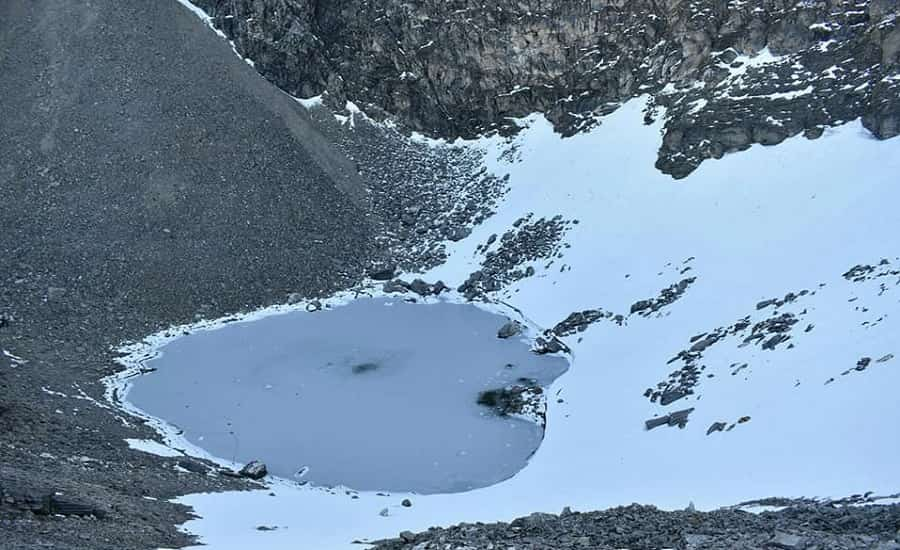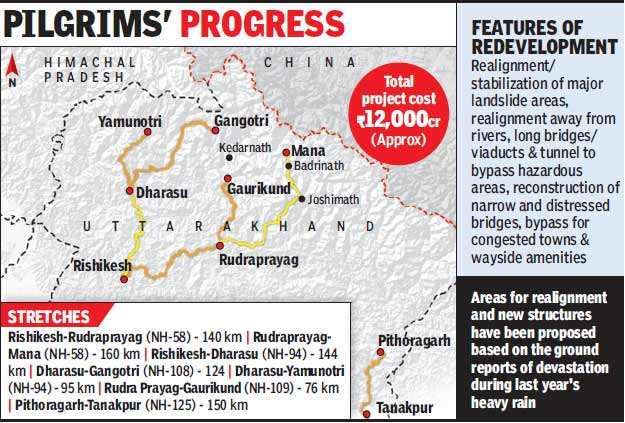Uttarakhand Switch to Hindi
Roopkund Lake: In Peril Due to Climate Change
Why in News?
Recently, the famous Roopkund Lake in Uttarakhand, known for its centuries-old human skeletons, is shrinking as climate change affects its size and ecosystem.
Key Points
- Roopkund Lake:
- The skeletons found in Roopkund are believed to date back to the 9th century.
- Genetic studies indicate that these individuals came from diverse groups, including a Mediterranean lineage.
- Theories suggest they were either pilgrims or traders who perished during a sudden hailstorm, with massive hailstones being the possible cause of death.
- Scientific Studies on Roopkund's Skeletons:
- Modern research has uncovered DNA traces from multiple ethnicities, some as recent as the 19th century, suggesting Roopkund may have been visited over a prolonged period.
- Researchers believe that Roopkund was once a sacred site, and the pilgrims likely traveled long distances before meeting their demise in this isolated, high-altitude lake.
- Environmental Impact of Climate Change:
- The decline in glacier size, altered monsoon patterns, and erratic snowfall have caused a reduction in water levels at Roopkund.
- Changes in temperature and weather are affecting the region’s flora and fauna, contributing to the ecological imbalance around the lake.
- Tourism and Conservation Challenges:
- Roopkund's reduced size and environmental degradation are making it harder to preserve the lake's unique history and ecological significance.
- There are growing concerns that unchecked tourism and insufficient conservation efforts may exacerbate the damage caused by climate change.
Uttarakhand Switch to Hindi
Chardham Project in Uttarakhand
Why in News?
Recently, the Centre informed the Supreme Court that 75% of the work on the Chardham Project, designed to improve connectivity to four major pilgrimage sites in Uttarakhand, has been completed.
Key Points
- Chardham Project:
- The project involves the construction of a 900-kilometer all-weather road to provide better connectivity to Yamunotri, Gangotri, Kedarnath, and Badrinath.
- The project is strategically important as it extends to regions near the China border.
- The new highways will make travel easier and safer, especially during monsoons and winter, when the existing roads become prone to landslides and blockages.
- Oversight Committee:
- The Supreme Court had previously formed an oversight committee headed by retired Supreme Court judge Justice A.K. Sikri to address environmental concerns.
- The committee has submitted two reports to the Supreme Court, one in April 2024 and another on 27th August, 2024, assessing the project's progress and compliance with guidelines.
- Environmental Concerns and Court Orders:
- The project faced opposition due to environmental concerns related to the sensitive Himalayan ecosystem.
- In December 2021, the Supreme Court allowed double-lane widening of the Chardham Highway but placed oversight responsibilities on the Sikri-led committee to mitigate environmental damage.
- The oversight committee does not have the mandate to conduct a fresh environmental impact assessment but monitors the execution of the project.
- Support from Government Ministries:
- The committee has the complete backing of the Ministries of Defence, Road Transport, and Environment.
- The Uttarakhand Government and local district magistrates are also cooperating with the committee.
- Representatives from the National Environmental Research Institute and the Forest Research Institute (Dehradun) are part of the environmental oversight mechanism.












.jpg)







.png)


.jpg)

 PCS Parikshan
PCS Parikshan



